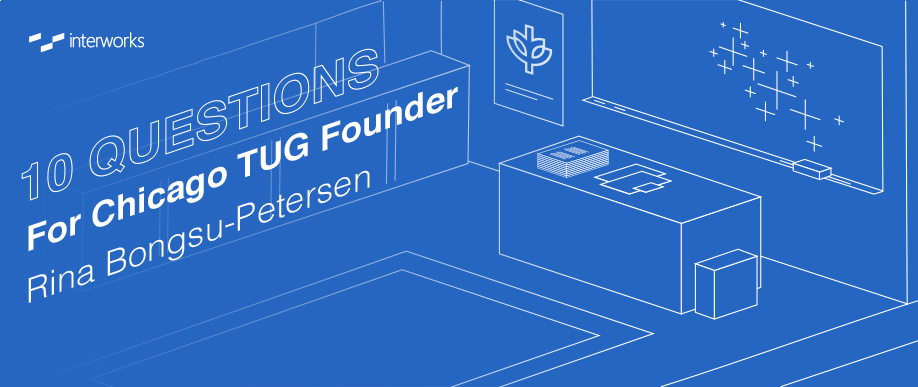10 Questions is an ongoing blog series in which Tableau Zen Master Dan Murray interviews some of the brightest folks in the world of data.

I discovered Rina in 2009 because she was the winner of Tableau’s first visualization contest for a dashboard called “Fit and Fat in America.” I called her in to do an interview for a blog post. We spoke for over an hour, but our Tableau/BI consulting business hit an inflection point that month, and I never got around to writing the blog post. Rina is a delightful person. Since then, she’s invited me to speak at the Chicago TUG, and I’ve visited her at DePaul on a couple of occasions. One of her co-workers, Jon Boeckenstedt, is also an active Tableau blogger. Rina is one of the Tableau pioneers in higher education.
The Questions
Q: When did you start using Tableau and why?
Bongsu-Petersen: In 2008. I was just playing around with it to create static visuals for presentations. I then fell in love with the software and spent many evenings just playing with it.
Q: How did you do your initial training? Ongoing skill development?
Bongsu-Petersen: In the beginning, I used it intermittently. Thus, I kept forgetting where things were or how to do certain things. I got frustrated at times, but since the software is so appealing and attractive, I kept going. Once I passed that initial hump, I never looked back. I find that the best way to keep going is to keep using it, learn from other users, watch the training videos and read some blogs. There is so much material out there; if one has time and dedication, they can learn quite a bit on their own.
Q: Are you expert at SQL?
Bongsu-Petersen: I took some classes on SQL a long time ago. I understand and can write some basic SQL, but I’m not a SQL expert.
Q: Do you use any data preparation tools outside of Tableau?
Bongsu-Petersen: I usually use Excel or Access for small, less complex data sets. DePaul has an IT department that handles the more complex ETL (Extract Transform and Load) requirements. I also use the Excel add-ons for Tableau often.
I’m sure I have helped many users via the forums, but I can assure you that the forums have helped me advance my skills to an even greater degree. Like many things in life, you really do get what you put in when using the forums. I can tell you that taking the time to really think about a problem, parsing out what is necessary to build a solution in Tableau, and being able to write out or explain what Tableau is doing in certain situations has influenced and guided my professional life significantly. In that way, the forums have been a great place for me to grow and develop professionally; however, this was a natural occurrence. I was not trying to become a Zen Master or trying to get recognized in any way – it just sort-of happened on its own. I get a lot out of the forums when I put the time and effort into solving problems there.
Q: What was it like to be the winner of the first Tableau data visualization competition with your viz, “Fit and Fat in America?”
Bongsu-Petersen: I am glad that I adopted Tableau early and was chosen as the winner for the first Tableau data viz contest. I still remember screaming so loud when I got the news from Elissa Fink. Winning the contest is like getting an endorsement. It feels nice to know that the experts agree with how I visualized that health data. It certainly gave me a boost of confidence in visualizing data, for sure.
Q: Are you involved in a Chicago TUG?
Bongsu-Petersen: Yes, I started the Chicago TUG not long after I won the contest mentioned above. The Chicago TUG meets quarterly at DePaul University. Come and visit us.
Q: You did a cool dashboard using IPEDS data that’s on your Tableau Public profile. What is IPEDS data? Tell me about that dashboard.
Bongsu-Petersen: IPEDS is the primary source for data on all colleges/universities in the U.S. The dashboard allows users compare colleges based on two selected metrics. For example, a parent who has a child in junior high may want to investigate a list of potential colleges his or her child could attend. One may want to know how much a school will cost and what the graduation rates are for the college within a typical time period for completing coursework and graduating from that college. My “College Compare” dashboard enables you to pick graduation rate and net price according to his family income. The dashboard produces a scatter plot visualizing the result. The user can enter a specific college of interest and see how the college compares with other schools.
Q: How do you use Tableau at your job today?
Bongsu-Petersen: I use Tableau for any visualization work that I need to create. I also help train other staff members at DePaul about Tableau. I also organize the internal Tableau User Group. From time to time, I give lectures on Tableau to our graduate students in the School of Computing & Digital Media. It is fun to see their eyes light up. When I have extra time, I visualize public data. I recently visualized the Indonesian presidential election and my local school district board election campaign.
Q: Where do you get your data visualization inspiration?
Bongsu-Petersen: There are many excellent visualizations out there. I usually print out my favorites and tape it on my “idea” wall. I try to start with the question, “What do the users want or need to know.” Sometimes, I come up with the visuals after I play with the data. This usually happens when using public data or analyzing a topic that I am less familiar with. The next step is to synthesize the data. Part of the job as an analyst is to present findings that have been pre-digested. The rest involves dealing with design issues. I want my visualizations to use space effectively, simply and focus the audience on the important information contained in the data. And don’t forget to do usability testing. That is very important.
Q: What would you like to see Tableau add to the desktop and/or server products in the future?
Bongsu-Petersen: I’d like to see the ability to add a visualization (sheet) inside a tooltip soon, and it would be great if Tableau could make it easier to prepare raw data inside Tableau Desktop. I would also like to learn more of the nuances regarding how Tableau connects to and presents data. As for Tableau Server, I’d like to see server metadata reporting as part of the software. This could mean data source reporting, frequency, efficiency, etc. It would be nice to have this as a default report in Tableau Server.
Note: You can see a list of upcoming features in Tableau 9.3 here or by downloading the attached PDF.
Discover More Interviews
Want to read more insightful interviews like this one? Then you’ll love our 10 Questions blog series. Check out the full list of interviews here, and stay tuned for new additions.
Need Help? Let Us Know!
There you have it. If you need help with your data infrastructure or Tableau, we have the experience, skill, and knowledge to insure your success. Contact us today to learn more.
If you’re in college and think you might want to get into this game, head to our Careers page and apply for one of our open jobs. We’d love to hear from you.

